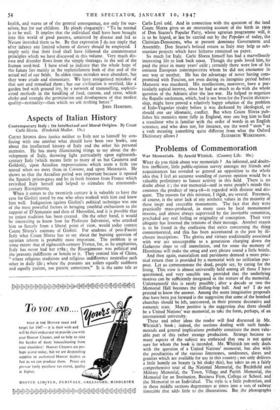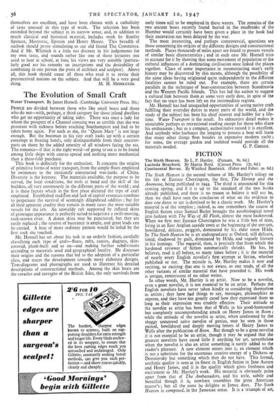Problems of Commemoration
War Memorials. By Arnold Whittick. (Country Life. 30s.)
WHAT do you think about war memorials ? An informal, and doubt- less inefficient, little public-opinion survey amongst my friends and acquaintances has revealed so general an opposition to the whole idea that I feel an accurate sounding of current opinion would be a valuable preliminary to future activity in this field. There is no doubt about it ; the war memorial—and in most people's minds this connotes the product of 1914-18—is regarded with distaste and dis- quiet. The reasons for this mistrust, I think, are several. Foremost, of course, is the utter lack of any aesthetic values in the majority of these inept and execrable monuments. The fact that they were practically mass-produced, in many cases by local monumental masons, and almost always supervised by the inevitable committee, precluded any real feeling or originality of conception. Their very ubiquity has lessened the tensions of their message. Anothei reason is to be found in 'the confusion that exists concerning the thing commemorated, and this has been accentuated in the past by ill- chosen inscriptions. The glories and virtues traditionally associated with war are unacceptable to a generation charging down the Gadarene slope to self immolation, and for some the memory of Hiroshima will make the smug and easy phrase sound a little brittle.
And then again, materialism and parsimony demand a more prac- tical return than is provided by a memorial with no utilitarian pur- pose. Let us commemorate the dead, people say, by caring for the living. This view is almost universally held among all those I have questioned, and very sensible too, provided that the underlying motives can be sufficiently integrated in the texture of the memorial. Unfortunately this is rarely possible - after a decade or two the Memorial Hall becomes the shilling-hop hall. And so? I do not pretend to know the answer. Among the more imaginative proposals that have been put forward is the suggestion that some of the bombed churches should be left, unrestored, in their present decorative and romantic state. More positive is the suggestion that there should be a United Nations' war memorial, to take the form, perhaps, of an international university.
These and other ideas the reader will find discussed in Mr. Whittick's book ; indeed, the sections dealing with such funda- mentals and general implications probably constitute the most valu- able part of this rather strange production. Strange because so many aspects of the subject are embraced that one is not quite sure for whom the book is intended. Mr. Whittick not only deals with the question of a United Nations' memorial, but also with the peculiarities of the various limestones, sandstones, slates and
granites which are available for use in this country; only delivers a little homily on beauty (a bit shaky this), but mtes us on a fairly comprehensive tour of the National Memorial, the Battlefield and Military Memorial, the Town, Village and Parish Memorial, the, Memorial for an Institution, Business Firm, College or School, and the Memorial to an Individual. The style is a little pedestrian, and in these middle sections degenerates at times into a sort of railway timetable that adds little to the illustrations. But the photographs
themselves are excellent, and have been chosen with a catholicity of taste unusual in this type of work. The selection has been extended beyond the subject in its narrow sense, and, in addition to much classical and historical material, includes work by Stanley Spencer, Mestrovic, Epstein and Henry Moore. This breadth of outlook should prove stimulating to our old friend The Committee. And if Mr. Whittick is a little too discreet in his judgements for my own taste, and sounds rather like one of those lecturers one used to hear at school, at least his views are very sensible (particu- larly good are his remarks on inscriptions and the desirability of combining in one person the posts of architect and sculptor). Above all, this book should cause all those who read it to revise their preconceived notions on the subject. And that will be a very good



































 Previous page
Previous page